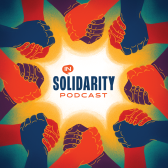Podcasts
Image

In a complex, modern society, we’re deeply connected in ways that often go unnoticed. On In Solidarity: Connecting Power, Place and Health, podcast hosts Ericka Burroughs-Girardi and Beth Silver explore these connections in interviews with some of our country's brightest minds and biggest thinkers. Join the conversation on In Solidarity today.



